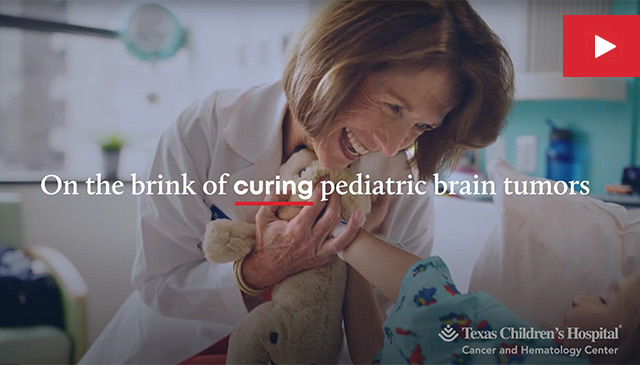
Every day we make the impossible possible by doing things differently. Click here to see it again.

Every day we make the impossible possible by doing things differently. Click here to see it again.
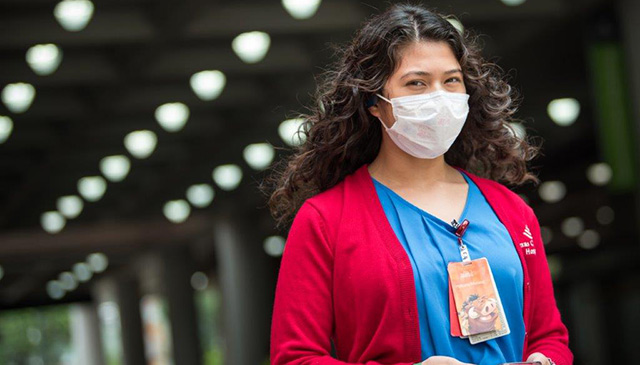
As children across Texas head back to school this month and next, Texas Children’s is preparing for a potential spike in COVID-19 cases. Although it is unclear what will happen when kids return to class, there is a chance that more people will contract COVID-19 due to increased exposure to the virus.
Denise Tanner-Brown, assistant vice president of Community and Ambulatory Nursing, said she is cautiously optimistic considering many schools are starting back virtually, but that no one knows what the next step might be and how that will affect the situation.
“We are standing ready for a second wave of cases and are not letting down our guard,” Tanner-Brown said. “As patient volumes decrease, we have a deactivation strategy where we can temporarily close down units. But, we also have an activation strategy in place where we can turn it back on really quickly should the situation change.”
Critical Care Director of Nursing Shannon Zerber said one of the things Texas Children’s has done well throughout the pandemic that’s reduced the stress of potential surges is adequate planning for space and staff.
A team of experts from across the organization has a tri-campus multitier plan that lays out multiple levels of response. The plan starts with sending patients to the Special Isolation Unit at Texas Children’s Hospital West Campus. Additional beds dedicated to COVID-19 patients are designated at Texas Children’s Hospital in the Medical Center Main Campus, including 13 acute care beds, and six additional ICU beds.
“As our COVID-19 volumes change at Texas Children’s, in Houston and the region, we adapt and flex to demand,” Zerber said. “There is a patient placement group that meets routinely to look at the latest data, so we are ahead of things, not behind. We are anticipating what will happen next.” As a result, Zerber said “everyone is prepared for a spike when school goes back, especially face to face. We all hope it won’t happen but we are ready if it does.”
Dr. Amy Arrington, medical director of the SIU, said the biggest surge Texas Children’s has seen so far was at the end of June and the beginning of July. During that time, all 18 beds in the dedicated biocontainment unit were full and patients were also being cared for at the Medical Center campus.
Since then, the number of COVID-19 patients has dropped, but there has been an increase in the number of patients with multi-system inflammatory syndrome (MIS-C), a delayed inflammatory response to COVID-19 that typically presents four to six weeks after exposure. The syndrome is typically seen in children and teenagers and has varying effects on vital organs, including the heart. Arrington said although the condition is rare, clinicians across the nation are seeing an uptick in cases and that this trend could continue as more children head back to school and are potentially exposed to and contract COVID-19.
Caring for patients with MIS-C takes a tremendous amount of resources and expertise as many patients require stays in the intensive care unit, some of whom need specialized treatment such as extracorporeal membrane oxygenation (ECMO), a treatment that uses a pump to circulate blood through an artificial lung back into the bloodstream.
Texas Children’s has the resources and the expertise to care for these patients. We have intensive care specialists, cardiologists, surgeons, and specialists in rheumatology, infectious diseases and immunology investigating and treating the children as aggressively as needed to ensure they have the best possible outcome.
Chief of Critical Care Dr. Lara Shekerdemian, who has been directly involved in the organization of the intensive care of the 30 plus MIS-C cases at Texas Children’s throughout the pandemic, said Texas Children’s has the capacity to handle a surge of these patients even if it means using areas that aren’t currently being used. Although she said it is unlikely we will see an exponential growth in the number of cases of MIS-C, Shekerdemian emphasized that the capacity is there to care for all those who need the specialized care Texas Children’s can provide.
Arrington agreed and said “So far, space and staffing have never been an issue due to adequate planning and dedicated staff willing to show up for countless extra shifts, work as a unified team and generally go above and beyond. But, we must remain vigilant in our prevention and safety measures.”
Dr. Judith Campbell, medical director of Infection Control and Prevention, added that clinicians at Texas Children’s and other medical institutions from across the world are in a much better position to care for COVID-19 and MIS-C patients than they were in March when the pandemic began.
“We have good evidence now about how to care for patients safely,” Campbell said. “We also have a better supply of personal protective equipment, which makes clinicians and staff feel safer when they are caring for a positive patient.”
Staying on top of the latest research, looking at where we can do better and remaining steadfast in our dedication to our safety measures and protocols, however, are key to our continued success, Campbell said, adding that there is no room to lessen our determination in this pandemic.
Texas Children’s remains committed to providing the safest environment for our patients, families and employees. Since the beginning of the pandemic, we have done an excellent job at keeping people safe while continuing to be there for our patients and deliver top notch care.
Three safety measures that have been implemented across our system and that work very well revolve around screening, social distancing and wearing the proper personal protective equipment. We are constantly adapting and improving these efforts as the situation progresses and changes, but believe we have established a good foundational practice that will be part of our organization for some time to come.
As a reminder, everyone who walks into one of our facilities is stopped and screened for symptoms of COVID-19. Patients, family members and employees alike must fill out a questionnaire about any current symptoms they might have and any recent trips they might have taken. The screening process also includes a temperature check. Months ago, we invested in thermal imaging cameras at our three hospitals to expedite the process and to make it safer for our employees who are administering the screenings.
When on our campus or in any of our facilities, we ask patients, family members and even our own employees to please keep a safe distance of approximately 6 feet from others whenever and wherever possible, including waiting in line and riding in our elevators. We have placed signs and stickers across the system to help keep social distancing top of mind.
Wearing a mask is a must if you want to visit one of our facilities. Patients, family members, visitors and employees are issued a hospital-grade mask after being screened at one of our screening stations. Providers working in certain areas of our system wear additional PPE such as an N-95 mask, a procedure mask, goggles and/or an isolation gown depending on their risk level.
We also have instituted visitor restrictions, video and drive-through visits, precheck-in and online appointment and payment via MyChart, and curbside pharmacy pickup to mitigate any potential exposure to COVID-19 and to alleviate people’s worries about coming to one of our facilities for care.
We have robust testing capabilities and the nation’s largest pediatric primary care network in the nation standing on the front lines of this pandemic triaging patients who might have the virus and helping care for those who do. Texas Children’s Pediatrics is also helping administer COVID-19 tests at our testing sites across the organization and they are continuing to administer much-needed wellness visits and routine vaccines, including the flu vaccine, which will be more than ever for people to receive.
“We have been thoughtful and careful in our planning so that we can turn on a dime if we need to,” said Texas Children’s Pediatrics President Kay Tittle. “Throughout this pandemic, we have figured out how to be more flexible to meet the needs of our families. This will continue to be key in order for us to stay the course and to face whatever comes next.”
Shekerdemian said testing will be extremely important when school opens in order to slow the spread of the virus. It is imperative, she said, that people are honest with themselves and others when they don’t feel well.
“Don’t brush things aside,” Shekerdemian said. “If you (or your family member) don’t feel well, then call your physician and if necessary, isolate yourself and get a test.”
Campbell agreed and said the fall will definitely present an interesting chapter in the story of COVID-19 as it overlays other virial infections that occur commonly in the fall and winter months.
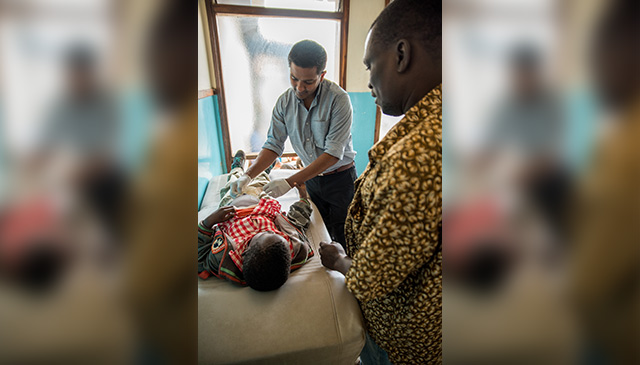
While Texas Children’s employees work locally to keep COVID-19 at bay, members of our system’s global health team are working just as hard to keep the disease from spreading in areas that are far more vulnerable to the pandemic.
“Low- and middle-income countries in places like Africa and Latin America are already stressed and strained with weak health systems and vulnerable populations,” said Dr. Heather Haq, Chief Medical Officer for the Baylor College of Medicine International Pediatric Aids Initiative (BIPAI) at Texas Children’s Hospital. “We will see devastating effects if COVID-19 becomes widespread in these areas.”
BIPAI at Texas Children’s Hospital is one of the largest global maternal and child health programs in the world with a presence across sub-Saharan Africa as well as Latin America and Romania. Our mission in these countries is the same as it is here in the United States – to care for sick children and women, and to educate more people to do the same.
Tremendous progress has been made in these communities over the years in the areas of HIV/AIDS cancer, tuberculosis, malaria, sickle cell disease and malnutrition; however much work needs to be done to ensure that COVID-19 does not undo these gains. Although the disease has yet to reach these areas in full force, it’s coming, and Texas Children’s and Baylor are standing ready to help fight its effects. Partnerships forged between Texas Children’s, government officials and local leaders are already helping forge a productive path forward in the face of this global crisis.
“We are extremely thankful for the continued commitment Texas Children’s and Baylor have to their global partners,” said Dr. Mogomotsi Matshaba, Executive Director of BIPAI’s operations in Botswana. “We need your expertise, guidance, moral support and financial assistance to get through this trying time.”
BIPAI at Texas Children’s Hospital is working around the clock to provide technical assistance and resources to help our global partners prepare for and respond to COVID-19 while maintaining access to essential services like continued access to antiretroviral therapy for people living with HIV. The BIPAI network holds daily calls to discuss strategies to protect the health care workforce, contain the spread of COVID-19, and continue to serve patients. In addition, they hold weekly video conferences focused on pertinent clinical information on COVID-19 and have established a COVID-19 resource library for global sites.
Texas Children’s and Baylor also are participating at national levels with local and regional leaders to shape policies aimed at curbing the impact of COVID-19 and protecting the work that’s already been done to strengthen their nations’ health care systems.
“It’s imperative we protect the gains we’ve made,” said Dr. Adeodata Kekitiinwa, BIPAI’s Executive Director in Uganda. “COVID-19 has the potential to wipe out years of work in areas where we are seeing significant gains.”
HIV/AIDS is one of the areas where great strides have been made. A setback such as the spread of COVID-19 – the effects of which are not yet known in people living with HIV – could be detrimental. In addition, children who need care for ailments such as malaria and malnutrition might not get the services they need if travel is restricted in countries or if resources are diverted to help those with COVID-19. Compounding the issue is that resources for critical care are already scarce in these areas. Uganda, for example, has only 55 ventilators for the entire country – that’s one ventilator per 1.3 million people. Other countries have even fewer.
“Unfortunately, the severe shortage of critical care means that many people in these settings who get sick with severe COVID-19 disease will die, until advances are made in treatments or a vaccine becomes available,” said Haq.
Phoebe Nyasulu, Executive Director of BIPAI’s operations in Malawi, said the severity of the situation means that COVID-19 has to be faced head-on and that it needs to be looked at from a global lens versus a country-by-country issue.
“With the help of BIPAI, Texas Children’s and Baylor College of Medicine, we are more confident we will be able to respond to COVID-19,” Nyasulu said. “We will get through this together.”
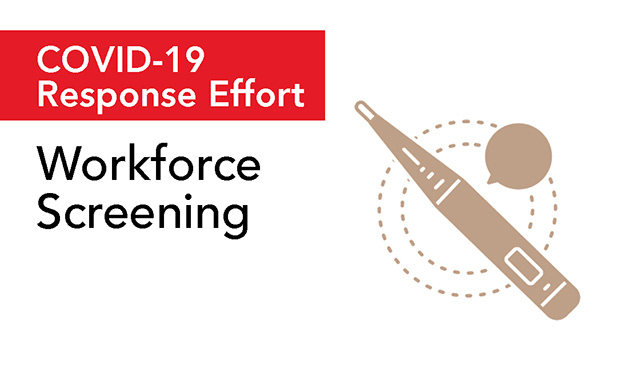
As part of our COVID-19 preparedness efforts, Texas Children’s is establishing mandatory screenings for all employees and staff beginning Monday, March 23.
Refer to the list of checkpoints below for your designated screening location. Plan to arrive at your designated screening location at least 15-30 minutes early. Some locations will have lengthy lines as our screeners and employees become more accustomed to this process. Allow yourself some additional time to get through screening and report to your normal work location as required. Employees will not receive compensation for any screening wait times.
If you are cleared to work, please place your wristband as soon as it is received.
Check your own temperature and symptoms before reporting to work. Do not come to work if you are sick. Your temperature will be checked as part of your screening and if you present symptoms consistent with COVID-19, you will not be allowed on site and will be provided information as to when you are able to return to work.
Each day that you are cleared to work, you will receive a different wristband each day to indicate you have been cleared. Be sure to wear your wristband and remind others to do the same.
Medical Center (includes Meyer building)
Feigin Circle for walkers and drop-offs
Garage 11 – Entrance
Garage 19 – Level 1 through 8
Legacy Tower – B3, B4 elevators only
West Campus
Back MOB entrance near service elevators
The Woodlands
MOB second-floor bridge
Health Plan
Main Lobby entry
Texas Children’s Pediatrics and Urgent Care
Upon entry to the practice/site
Specialty Care
Bellaire: near service elevators
Clear Lake: rear employee entrance
Cy-Fair: rear employee entrance
Sugar Land: first floor lobby by rear parking lot entrance
Maintain social distancing. Keep a safe distance (approximately 6 feet) between yourself and others while waiting in line to be screened and encourage your colleagues to follow suit. Stay in touch with your leader. We know it will take time to get used to being screened as part of your routine. Reach out to your leader for support and guidance throughout this process. Be mindful of Texas Children’s travel guidelines. You will be asked to answer travel questions as part of our screening. Remember: Any workforce member (employees, Baylor faculty or staff members) who has traveled greater than 150 miles cannot report to work at Texas Children’s until the 15th day following your return from travel. If you have returned to work already, you will be sent home until you meet this criteria.
To provide additional guidance and clarity about how Texas Children’s is assessing and clearing team members for on-site or remote work, click here to view these guidelines. Note, these will be updated as the situation evolves.

Texas Children’s is establishing labor pools to be staffed by employees across the system who have the skills and abilities to fulfill any potential labor needs during the COVID-19 event. The following labor pool roles are available at this time:
We are asking leaders and/or team members who have leadership approval and are interested in volunteering to follow the steps below. Prior to signing up, please speak to your leader to ensure you can be relieved of your current responsibilities without disrupting any core departmental operations.
As labor needs emerge, pool participants will be evaluated against any requirements. Team members selected to fulfill labor pool assignments will be contacted separately to confirm participation and will be provided with additional training, if applicable.
Please sign up via this link (best opened with Google Chrome) as soon as possible. A confirmation email will be sent to you and your immediate supervisor with shift details. Team members can request shifts for Emergency Center Nursing support via the COVID19 Labor Team inbox at covid19laborteam@texaschildrens.org. If you have any questions, please contact covid19laborteam@texaschildrens.org.
Team members interested in volunteering for the labor pools at West Campus or The Woodlands are to email the labor teams at their respective campus:
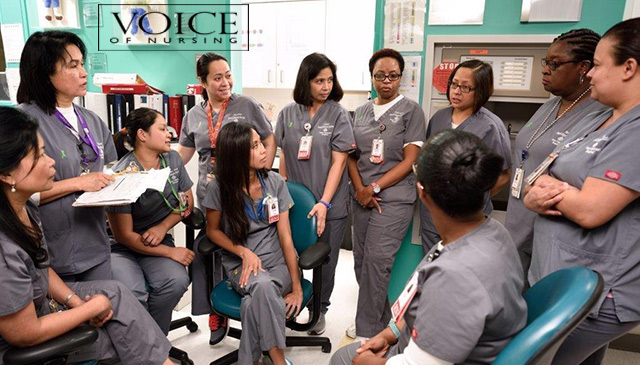
Chief Nursing Officer Mary Jo Andre shares the proactive measures we are taking to ensure the safety of our patients and care teams as we adapt and respond to the COVID-19 situation. Read more

On his blog last week, Mark Wallace shares how the evolving situation around COVID-19 proves the sturdiness of our organization as we work together with our community partners. Read more